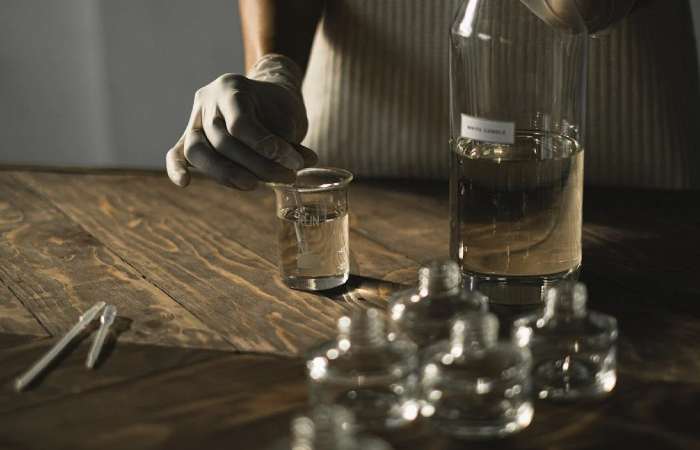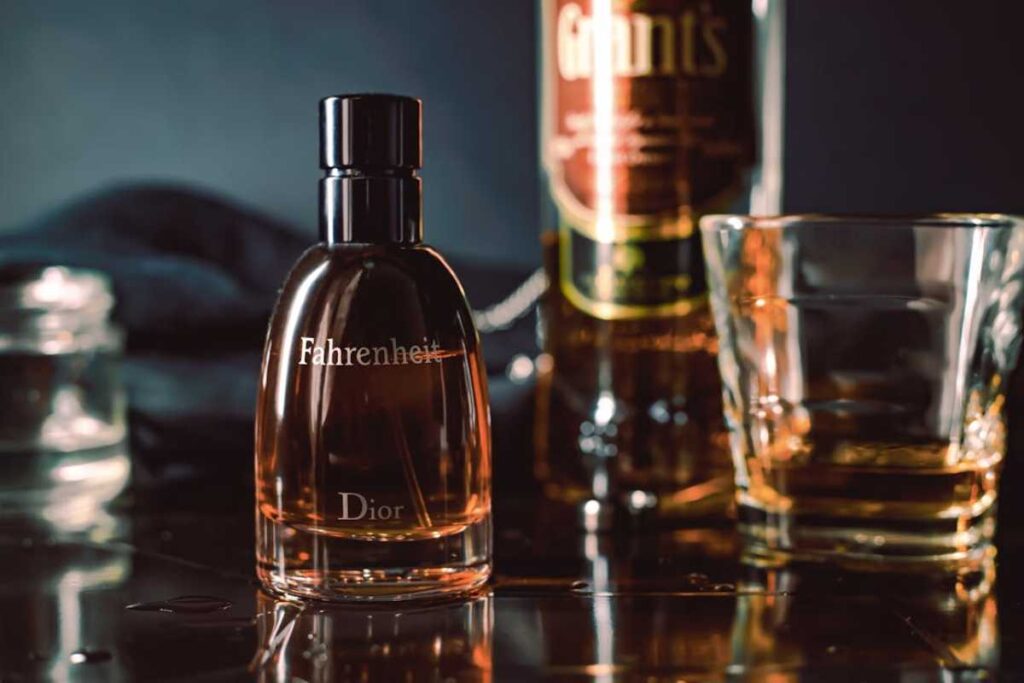The world of fragrance creation is as complex as it is fascinating. There are many ingredients involved in creating the final product, so understanding the role of each is essential. In this analysis, we investigate into the essence of perfume production by comparing two basic ingredients: perfume alcohol and perfume vodka.
What stays Perfumers Alcohol, and what is Perfumers Vodka?
Perfume alcohol and perfume vodka are the two main solvents in perfume making. They act as transporters for the aromatic compounds that make up a fragrance. Both are selected for their neutral odor, which allows the scent to develop without interference.
Perfume alcohol, or “specially denatured” Alcohol, is a mixture of ethanol, isopropyl myristate, and monopropylene glycol. It is the most widely used base in the perfume industry, favoured by its rapid evaporation, which leaves the scent on the skin.
On the other hand, perfume vodka is a high-proof neutral grain alcohol. This Vodka is distilled multiple times, ensuring it is odourless and tasteless. It is an excellent choice for perfumers looking for a natural, undenatured alcohol base.
Role of Alcohol in Perfume Making
The primary function of perfume alcohol in perfumery is to dissolve and transport the indispensable oils, principles, and other aromatic compounds that make up a fragrance. It is an invisible carrier that carries the scent to the skin and then evaporates, leaving the aroma behind.
Common Types and Their Unique Characteristics
The different types of perfume alcohols can be classified according to their denaturing agents. The most mutual type, SDA 40-B, is denatured with tert-butyl alcohol and Bitrex, making it undrinkable. Its high evaporation rate makes it ideal for colognes, as it helps the scent linger on the casing.
Another kind is SDA 39-C, denatured with diethyl phthalate. This variant is frequently used in cosmetics, including perfumes, due to its lower evaporation rate, which allows the scent to remain on the skin for longer.
Role of Vodka in Perfume Making

Perfumery vodka performs the same function as perfumery alcohol, acting as a fragrance carrier. However, it is less frequently used in perfumery and is generally preferred by home perfumers and natural perfume makers. Perfumery vodka is preferred when an undenatured alcohol base is required.
Common Types and Their Unique Characteristics
Perfumer’s Vodka is typically a strong, neutral grain spirit. The higher its alcohol content, the better it extracts and preserves aroma. For example, 190% vodka contains 95% alcohol, ensuring excellent solubility of aromatic compounds. It’s worth noting that choosing between Perfumer’s Alcohol and Perfumer’s Vodka isn’t just a matter of preference. Each has unique properties that affect evaporation rate, aroma diffusion, and the overall longevity of the perfume. Understanding their functions and characteristics is key to grasping the art and discipline of cologne formation.
Key Alterations between Perfumers Alcohol and Perfumers Vodka
- Fragrance Profile and Longevity: Eau de parfum evaporates faster, enhancing the initial impression of the scent. In contrast, vodka de parfum evaporates more slowly, potentially increasing longevity.
- Cost and Availability: Eau de parfum is generally more readily available and less expensive, making it a popular choice in profitable perfume production. While not excessively expensive, Vodka de parfum can be more challenging due to its specific distillation requirements.
- Safety and Regulatory Considerations: Vodka de parfum is unfit for consumption because it is denatured. This affects shipping and storage, as it is considered a hazardous material. Eau de parfum, being an undenatured spirit, does not have these restrictions, but may be subject to other regulations depending on the location.
- Ease of use for amateur and professional perfumers: Eau de parfum can be easier for beginners to use due to its rapid evaporation and ability to retain scent. Eau de parfum, due to its slower evaporation, may require greater skill to balance the aromatic composition, making it more suitable for experienced perfumers.
- Ingredients: Eau de parfum contains a mixture of ethanol, isopropyl myristate, and monopropylene glycol. Eau de parfum, on the other hand, is a pure, neutral grain alcohol.
- Effects on the skin: Eau de parfum can dry out the crust due to its high alcohol content. Eau de parfum, although it also contains Alcohol, can be less aeriation due to its slower disappearance.
Key Similarities amongst Perfumers Alcohol and Perfumers Vodka
- Carrier Function: Both eau-de-vie and vodka act as carriers for the aromatic compounds in perfumes, forming the base of the scent.
- Neutral Aroma: They are chosen for their neutral aroma, allowing the scent to take centre stage.
- Evaporation: Both evaporate after application, leaving the aromatic compounds on the skin.
- Compatibility: Both are compatible with a wide range of aromatic compounds, making them multipurpose in perfume making.
- Applications: Both are used in various colognes, from eau de parfum to eau de dressing and cologne.
- Versatility: Both are suitable for various cosmetic products, including body sprays and air fresheners.
- Availability: Despite their differences, both are available to amateur and professional perfumers.
Pros of Perfumers Alcohol over Perfumers Vodka:
- Availability: Alcohol is generally easier to find and less expensive.
- Fragrance Prevalence: Rapid evaporation can help enhance a fragrance’s first impression.
- Ease of Use: It may be more manageable for beginners due to its ability to retain fragrance.
- Industry Standard: It is the most widely used base in the fragrance industry.
- Compatibility: Likeminded with a wide range of fragrance complexes.
Cons of Perfumers Alcohol likened to Perfumers Vodka:
- Dry Skin: Eau de Parfum can sometimes dry out the skin.
- Instructions: Due to its denatured state, it may have shipping and storage limitations.
- Longevity of Scent: The scent may not last as long due to rapid evaporation.
- Ingredient Complexity: The blend of ingredients in Eau de Parfum may not be apposite for those seeking a simpler, more natural base.
- Scent Distortion: Rapid evaporation can alter the perceived balance between a scent’s top, middle, and base notes.
Pros of Perfumers Vodka over Perfumers Alcohol:
- Longevity: Slower evaporation can extend the duration of a fragrance.
- Skin Benefits: Evaporating Vodka can dry the skin less due to its slower evaporation.
- Simplicity of Formulation: As a pure, neutral grain alcohol, it may appeal to those seeking a more natural base.
- Rules: Since it is not denatured, it does not have the same shipping and storage restrictions as perfume alcohol.
- Fragrance Balance: Slower evaporation can contribute to a more balanced perception of a fragrance’s top, internal, and base notes.
Cons of Perfumers Vodka likened to Perfumers Alcohol:
- Availability: Perfumed Vodka may be harder to find and more expensive.
- Fragrance Prevalence: The aroma may not be as intense at first due to slower evaporation.
- Ease of Use: Balancing a fragrance composition with perfumed Vodka may require more experience and skill.
- Industry Recognition: Perfumed Vodka is less commonly used in the fragrance industry, which may affect the perception of its quality or professionalism.
- Compatibility: Despite its versatility, it may not be compatible with as wide a range of fragrance compounds as perfume whisky.
Circumstances when Perfumers Alcohol is better than Perfumers Vodka:
- Commercial Perfume Production: Thanks to its affordable and cost-effective price, perfumer’s Alcohol is an excellent choice for large-scale commercial perfume production.
- For Beginners: Its ease of use makes it ideal for those new to perfume making.
- Long-Lasting: The rapid evaporation of perfumer’s Alcohol makes it an excellent choice for fragrances that require an intense initial trail.
- Budget-Friendly Projects: For hobbyists or small businesses on a budget, the low cost of perfumer’s Alcohol can be a significant advantage.
- Broad Compatibility: The broad compatibility of perfumer’s Alcohol can be helpful when working with a wide range of fragrance compounds.
Situations when Perfumers Vodka is healthier than Perfumers Alcohol:
- Natural fragrance brands: For brands promoting natural or organic products, the simpler, undenatured formula of Perfumers Vodka may be more in line with their brand values.
- Long-lasting fragrances: If the goal is to create a longer fragrance, the slow evaporation of Perfumers Vodka can be an advantage.
- Creating complex fragrances: Perfumers Vodka can be an exciting challenge for experienced perfumers who want to experiment with fragrance balance and complexity.
- Formulas for sensitive skin: When creating a fragrance for people with subtle or dry skin, the less ventilation nature of Perfumers Vodka can be a significant advantage.
- Distinctive brand positioning: Using Perfumers Vodka can discriminate a brand in a market dominated by alcohol-based colognes.
How to Choose Amongst Perfumers Alcohol and Perfumers Vodka
After indicating a base for perfume making, the following factors should be considered:
- Desired fragrance profile: Are you seeking an intense, immediate effect or a more subtle, long-lasting scent?
- Cost: Consider your budget and the cost-effectiveness of the foundation.
- Availability: Is it easy to find a foundation?
- Safety and regulations: What are your area’s shipping and storage regulations?
- Experience: Are you a new or experienced perfumer?
- Skin type: Is this perfume suitable for sensitive or dry skin?
FAQs
What is the main difference between schnapps and Vodka?
The main difference lies in the evaporation rate and the effect on the aroma profile and duration.
Can schnapps be substituted for Vodka in a perfume recipe?
Yes, but it’s important to note that it can affect the final aroma profile and duration.
Is Vodka safe for the skin?
Yes, Vodka is safe for skin and can dry less than schnapps.
Which is more economical: schnapps or Vodka?
Generally, schnapps is cheaper and more widely available than Vodka.
Can regular Vodka be used instead of Vodka in perfume making?
While technically possible, regular Vodka may contain impurities that affect the aroma. Perfumers Vodka is formulated explicitly for perfumes and is generally a better choice.
Which fragrances are best suitable for Perfumers Alcohol?
Perfumers’ Alcohol is multipurpose and can be used for various fragrances. However, it is especially suited for fragrances that require an intense initial trail.
Which fragrances are best suited for Perfumers Vodka?
Perfumers Vodka is ideal for fragrances that need to linger and gradually reveal their aromatic notes due to its slower evaporation rate.
Are there any safety precautions when using Perfumers Alcohol?
Yes, Perfumers Alcohol is denatured, manufacture it unfit for consumption. Additionally, it is flammable and considered a hazardous material, which can affect its transportation and storing.
Do Perfumers’ Alcohol and Perfumers’ Vodka touch the scent of a scent?
Both are chosen for their neutral aroma, which allows the scent to develop. However, the difference in their vanishing rates can affect the perception and development of the aroma.
Perfumers Alcohol vs Vodka Summary
Both Alcohol and Vodka for perfumes have their advantages and disadvantages. The choice between the two largely depends on the desired result, the perfumer’s experience, and other factors such as cost, availability, and safety regulations. Whether you’re a beginner perfumer or a seasoned professional, understanding these nuances will help you make an informed decision during the fragrance creation process.
| Perfumers Alcohol | Perfumers Vodka | |
| Scent Profile and Longevity | Rapid evaporation leads to a strong initial scent but may not last as long | Slower evaporation may extend scent longevity |
| Cost and Accessibility | Generally more cost-effective and widely available | Can be harder to source and may be more expensive |
| Safety and Regulatory Considerations | Denatured, flammable, and considered a hazardous material for shipping/storage | Non-denatured, safer to handle, fewer shipping/storage restrictions |
| Ease of Use | Versatile and easy to use, good for beginners | May require more finesse and experience to balance a fragrance composition |
| Pros | Highly versatile, widely used, creates high sillage fragrances, cost-effective, broad compatibility with aromatic compounds | Potentially longer scent longevity, less drying on skin, simpler composition, fewer regulatory restrictions, can offer a nuanced scent balance |
| Cons | More complex composition, potential for scent distortion, may be drying on skin | May be harder to source, less initial scent projection, less commonly used in industry, might not be compatible with as wide a range of aromatic compounds |
| Better Situations | Commercial perfume production, beginner perfume making, high sillage fragrances, budget-friendly projects, when working with a wide range of aromatic compounds | Natural perfume brands, long-lasting fragrances, advanced perfume creation, sensitive skin formulations, distinctive brand positioning, regulation-sensitive projects, complex fragrance layering |
Perfumers: Alcohol and Vodka Review
Don’t Miss These: Why Are Perfume Bottles Not Full to 100% Capacity?

